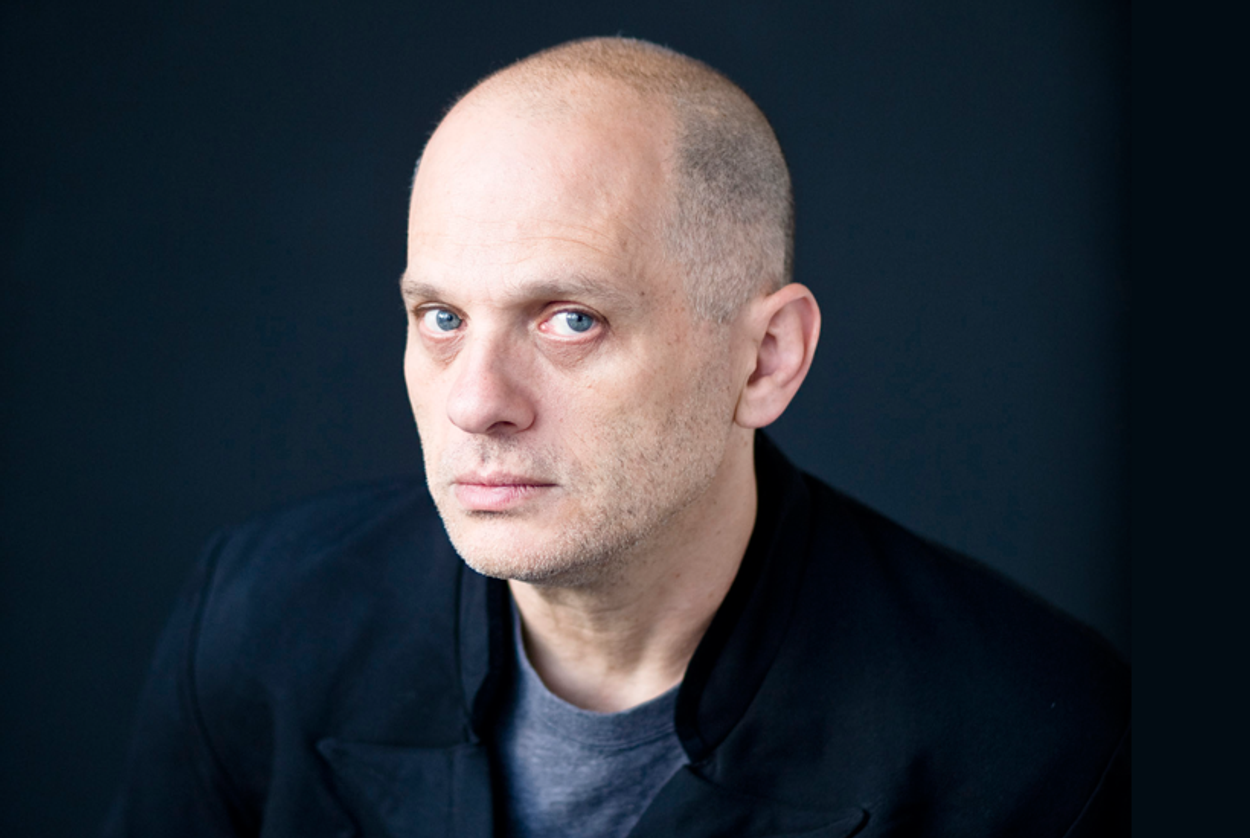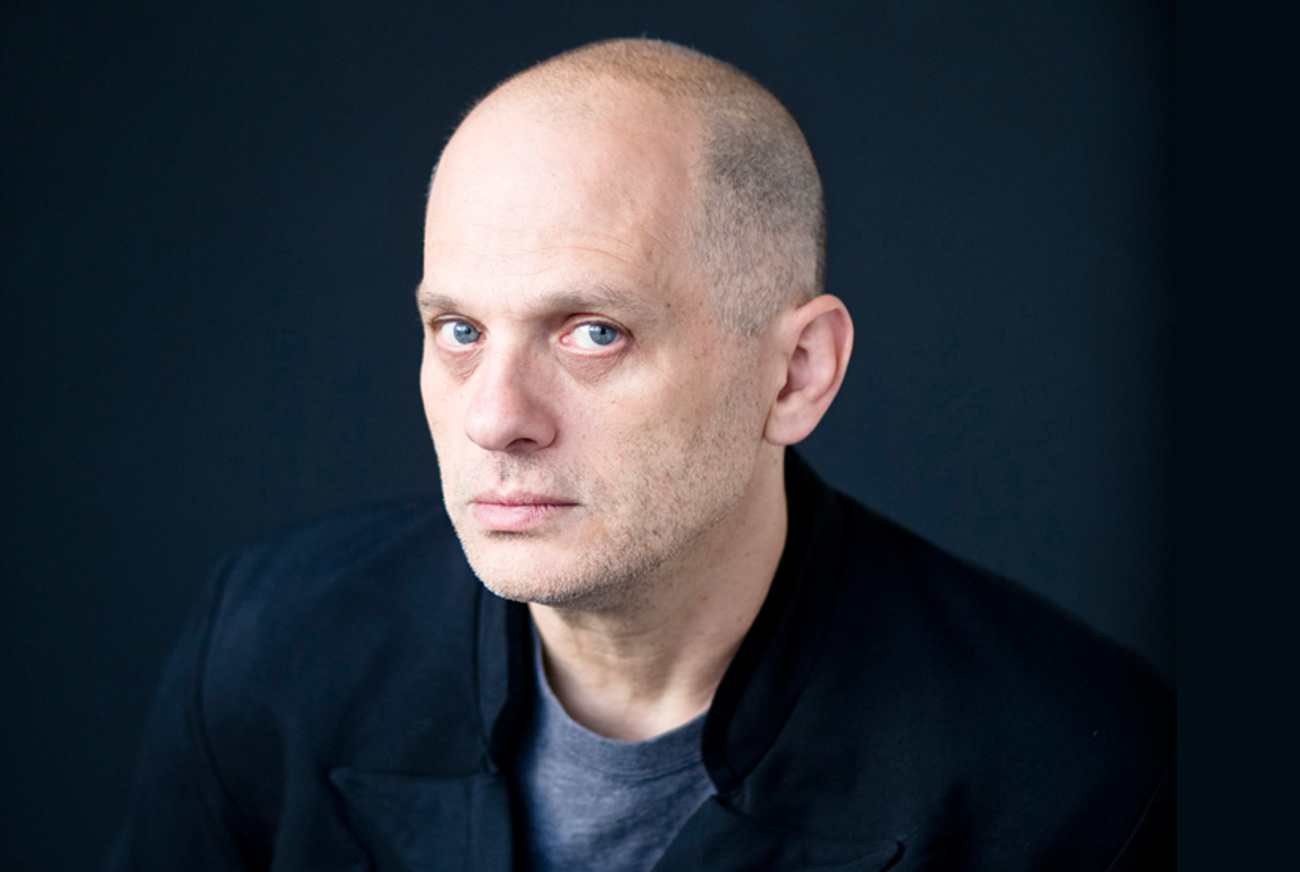Composer David Lang Thinks the Pulitzer Prize Is Creepy, Would Rather Bang on a Can
With his influential alternative music marathon this weekend, the anti-institutional artist grapples with accolades




The Pulitzer Prize-winning composer David Lang does not like hearing his music in concert. During a performance, he is anxious that people might not like his music, that someone might say something weird to him about it. He worries about recognizing an audience member’s face but forgetting his name, and he wonders how long he’ll stay for drinks at the after-party. “I don’t really listen,” he admitted. He likes hearing his music in rehearsal, where he can talk to the musicians, can instruct them to play louder or faster—and, most important, can continue to fine-tune the piece.
Few composers, though, have more chances to hear their work. With his 137 pieces (compositions and arrangements for film, dance, band, orchestra, chamber, choirs, soloists, and ensembles of up to 1,000) having been featured or included on 88 discs, Lang is, at 57 years old, one of the country’s most performed composers. He is also one of the most musically eclectic. On Mother’s Day 1987, after many breakfasts with his best friends and fellow composers Michael Gordon and Julia Wolfe discussing the disparity between their thousands of musical ideas and their limited options in expressing them (record labels and traditional concert halls have long been skeptical of orchestras that stray from Bach and Beethoven), the three of them held a 12-hour music marathon in the Soho gallery Art Exit. They named their show “Bang On a Can,” because that, Wolfe realized, was the essence of their experimentalist program: people sitting around banging on a can. The turnout was encouraging, so they turned the show into a collective of the same name, with a mission to create and cultivate new music in any way possible. More than 25 years later, Bang On a Can is a leader in the field, with constant commissions and its own band routinely performing all over the world; this year’s marathon, which will be held Sunday at Brookfield Place’s Winter Garden on the Hudson River in Lower Manhattan, will feature continuous new music for a mere eight hours.
***
The mainstreaming of the type of music Bang On a Can promotes—what Vanity Fair has described as “Lollapalooza advised by the ghost of John Cage”—parallels the mainstreaming of Lang’s musical evolution. Early in his career, he felt that music should electrify the listener, and so he wrote pieces like 1993’s cheating, lying, stealing (for chamber ensemble), which he noted in the program specifically refuted a classical composer’s indulgence to showcase his emotions with gushing melodies or his genius with an abstract, esoteric piece. What interested Lang, he wrote, was finding the “dirty seams in music.” Jeremy Geffen, Carnegie Hall’s artistic director, remembers being astounded by Lang’s ability to generate such a large, provocative sound with such a small combination of instruments, an effect Lang achieved partly by using two, potentially deafening, antiphonal brake drums. “It took you to a different sound world,” Geffen said.
Critics continue to praise Lang in the same way, but the music on which they are commenting can be vastly different. In 2008, when Lang won the Pulitzer for little match girl passion, juror Tim Page, a Washington Post writer, called the “largely unheralded” piece “unlike any music I know.” It was, stylistically and temperamentally, new for Lang, too. Musically, the piece is a 35-minute oratorio scored for four vocals, each of which plays simple percussion. It was Lang’s first bout with spare vocal writing in a mode The New Yorker’s Alex Ross has labeled “neo Medieval.”
Kind and witty, Lang speaks in a gracious, almost crackly voice that clashes with the intensity of his headshots, and he traffics seamlessly between sarcasm and unflinching musical intellectualism. He went on to tell me how the early days of polyphony involved people building complex structures based on single-line Gregorian chants. Everything he’s done with music, he said, has stemmed from his interest in this style. He grew up in Los Angeles in the ’60s, in a family of upwardly mobile, education-oriented intellectual Jewish immigrants. His father was a doctor whose parents had come from Lithuania, his mother a librarian, born in Germany. Their cultural tastes veered toward art, literature, sports—Lang’s dad taught him to keep score at Dodgers games—but not music. One rainy afternoon when Lang was in elementary school, instead of playing in the yard, his class watched a Leonard Bernstein “Young People’s Concert” featuring Shostakovich’s First Symphony. To introduce the piece, Bernstein explained that Shostakovich wrote it when he was 19 and instantly became world famous. The music enthralled Lang. He was 9, and his first thought, he said, was: “I have 10 years.”
His informal training began immediately. He borrowed instruments from school and friends, even though he couldn’t play them; he obtained and studied orchestra scores, even though he didn’t understand musical notation. When, for instance, he discovered his father’s record of Beethoven Violin Sonatas, he’d play the record, wait for a rest where he could provide accompaniment, make a corresponding squiggly line on the score, and blast away on the trombone at the right time.
When he was in junior high, his mom found boxes of his scribbled compositions. She took him across the street to meet UCLA’s head of composition, Henri Lazarof. For the next two years, during their twice-weekly lessons, Lazarof, a stern and precise Bulgarian by way of Israel, both terrified and gratified Lang, teaching him harmony, counterpoint, and a vast amount of repertoire. Lang also found a thrill in uncovering his teacher’s inversion patterns during ear training, so that he could complete the exercises without paying attention. It was his subversive side that eventually attracted Lang to Philip Glass and Steve Reich, whose minimalist music he discovered while working in a record store as a high-school senior.
The next year he went to Stanford, where, cocky from his advanced formal training, he walked into the music department and demanded he be given a test to pass out of his requirements. The department capitulated, and Lang started an ensemble with friends, giving Fluxus and improv concerts, sometimes attracting 20 people, sometimes zero. The numbers didn’t matter; he was just excited about music that seemed anti-institutional. When his ensemble performed La Monte Young’s Piano Piece for David Tudor #1, where the performer feeds the piano a bale of hay, Stanford banned him from using official university pianos. In his family, it was assumed that, like his father had, he would go to medical school. He’d even enrolled at Stanford as a chemistry major, only to find himself going to chemistry classes solely for tests. He dropped the major and toyed with theater, art history, and medieval studies—but couldn’t shake his musical impulses. When he took a class with the composer Martin Jenni, he was blown away by Jenni’s knowledge and followed him to the University of Iowa for grad school and eventually wound up at Yale, where he continued to clash with superiors.
Once, while he was giving a presentation to a faculty committee, an antagonistic professor asked him a question in an obnoxious way, and Lang gave an equally antagonistic response. Immediately afterward, he had a lesson with the department chair, Jacob Druckman, a composer who’d studied with Aaron Copland, won the Pulitzer, and taught musicians like Donald Fagen (who co-founded Steely Dan). Druckman was fuming mad, but he weighed whether or not acknowledging Lang’s insubordination was worth the energy. Finally, he pushed aside Lang’s music and berated him. When his anger subsided, he explained that music, being a social endeavor, forced composers into troublesome situations. If Lang reacted haughtily when someone with power insulted him, what would he do when a performer played his music badly? “It was very humbling,” Lang says now. “I felt terrible. I was so upset that he’d called me on this. And what he said was very, very beautiful. Writing music is not about yourself. If done right, it’s an act of citizenship.”
Lang graduated the next spring and moved to Soho, the place he’d romanticized since learning that Glass and Reich lived in the neighborhood. His first piece, Illumination Rounds—a sneaky, snaking duet for violin and piano, commissioned by Leslie Shank, a then-Juilliard violinist who’s now been with the St. Paul Chamber Orchestra for 30 years—had recently been performed at Carnegie Hall. In 1985, Jacob Druckman, who was composer-in-residence at the New York Philharmonic, nabbed Lang as his co-resident. A grant from the New York Foundation for the Arts led to a concert of his music at Cooper-Hewitt Museum. A short time later, Bang On a Can was conceived.
After Lang won the Pulitzer—which, having no idea he was even nominated, he learned about when NPR called to ask for comments—he told New York magazine it was “slightly creepy” that suddenly his music was “safe to listen to.” But he was aware that the mainstream sanctioning would provide him with opportunities to “do even more ridiculous or meaningful things.” Yale gave him a teaching job, which he still has.
Last season, he held the Debs Composer’s Chair at Carnegie Hall, where his final official activity was collected stories, a six-series weeklong production whose themes he’d begun thinking about in the mid-’90s while simultaneously working on a grand opera in Santa Fe and a blowout static piece for the English post-rock ensemble Icebreaker. Composers featured in collected stories were as varied as John Cage, Nico Muhly, and Franz Liszt; performers ranged from rapper Aesop Rock to actor Paul Lazar. Lang himself was writing a new piece, mystery sonatas, inspired by Heinrich Ignaz Franz Biber’s legendary pieces about the mysteries of Jesus but appropriated, once again, to be about something else—the mysteries of music. And his work continues. This month, Lang had a world premiere, co-commissioned by the Birmingham Contemporary Music Group, the Berlin Philharmonic, and the Spitalfields Music Festival in London, of another piece he conceived 20 years ago but didn’t have an outlet for: crowd out, which consists of 1,000 people yelling in the street. Last August, the whisper opera, a piece of lyrical theater, debuted at the Mostly Mozart festival. In it, the soprano Tony Arnold walked atop a small platform stage amid white lace curtains, whispering cryptic sentences, accompanied by cello, percussion, flutes, and clarinets. Text came from obscure phrases Lang found online, like “when I am alone I always” and “it’s not my fault that I am so.”
With only five performances at Lincoln Center’s Clark Studio Theater, in a specially designed set that only seated 48, the piece represented Lang’s persistence in challenging musical assumptions. “Why, in an orchestra, do these people get along?” he wonders. “Why does a concert happen in a concert hall? Why does a concert have this format? Why should a piece of music be reproducible? Why should my goal be to make a piece that I can put on YouTube and sell a million copies of?”
***
Like this article? Sign up for our Daily Digest to get Tablet Magazine’s new content in your inbox each morning.
Nathan Schiller is a writer living in Brooklyn.
Nathan Schiller is a writer living in Brooklyn.